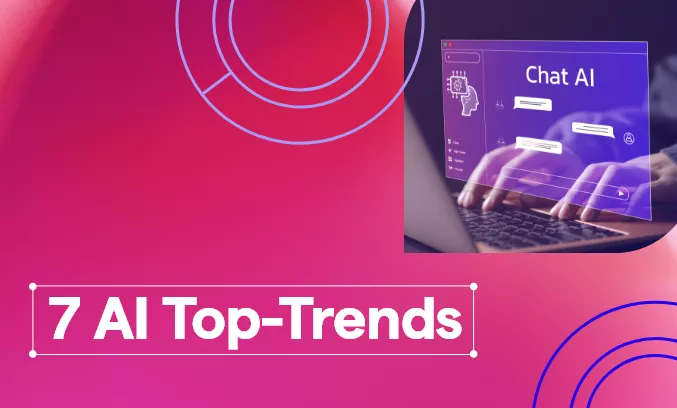Blog
7 Top Trends That Will Shape the Year 2024 Through Generative AI

Janina Abou Al Ward
Product Marketing Manager, Retresco
Never before has a trend topic developed as rapidly as the integration of generative AI and text automation into everyday work over the past year.
But what comes next?
We take a look at the AI trends of 2024 and how they will influence content creation.

1. Trend: Multimodal and Domain-Specific Language Models
In 2024, the demands on large language models to process various types of data will increase. At the same time, these models will become significantly more domain-specific – for example, in the form of legal or media-specific language models.
Both OpenAI’s new GPT models and Google’s Gemini already incorporate visual material alongside texts into content creation. Market participants can especially look forward to GPT-5, which is expected to be available in 2024. The integration of all data types – text-based, visual, and auditory – expands the underlying knowledge base of language models, helping them better contextualise applications and deliver more intelligent and comprehensive results. The ability to process information from all content sources also enables language models to connect and serve multiple knowledge areas simultaneously instead of being tailored to specific use cases.
2. Trend: The New AI Search – Google Search Generative Experience
With the introduction of intelligent AI search in the Google search engine called AI Overviews (former SGE or Search Generative Experience), the requirements for online content to appear in SERPs are changing. Due to the enhanced ability to obtain information directly on the search engine page, there is an expectation of dropping organic traffic to third-party landing pages. This update affects both the adjustment of SEO strategies and extensive modifications to existing website content to land a spot inside the AI Overviews display. Especially in eCommerce, we anticipate that the effort for content managers to tailor content to potential customer inquiries will increase. Through the use of innovative solutions like our Buying Intent Assistant, thousands of product texts are automated and aligned with current search queries, leading to improved results in SERPs.
3. Trend: Efficiency Boost in Online Publishing
In addition to accelerated content creation, generative AI will increasingly support digital media publishers in 2024 to make use of existing content by tailoring it to additional channels or target audiences. With the use of AI, content such as press releases and reports can be repurposed and adapted in style, tone, length, and keyword density with just a few clicks.
There are new emerging ways in which generative AI is being integrated into the digital media environment. While some media houses deny large language models access to their content, the collaboration between Axel Springer and OpenAI is a groundbreaking example of new possibilities to provide unique journalistic content to AI for training purposes while making their content usable within AI applications. With the progression of models, online publishers are now under pressure, and we expect an increasing exploration of the usability of large language models in the online media sector this year.
4. Trend: Data-Driven, Hyperpersonalised Shopping Experiences
2024 presents a significant opportunity for using AI in hyperpersonalised shopping experiences. By leveraging the availability and analysis of large data sets, eCommerce companies can recognise individual preferences of website visitors and dynamically adjust texts to meet individual user needs. Tailored recommendations lead to optimised shopping and better user experiences, which can also positively impact search engine rankings. We expect that hyperpersonalised content, even outside the open digital presence, such as in newsletter creation, will provide higher relevance, fostering increased trust and conversion readiness among recipients.
5. Trend: Integration of AI to Enhance Customer and Employee Experiences
In the new year, companies will continue to rely on AI to enhance customer experiences and increase employee productivity. For customers, support options and access to additional product information become more accessible through AI. In the corporate context, the use of generative AI enables the automation of repetitive and time-consuming processes, freeing up resources for creative and strategic work. However, we also recognise the challenge that monitoring AI, such as in automated content creation, can concentrate resources elsewhere.
6. Trend: The Role of Chief Artificial Intelligence Officers (CAIOs) in Leadership
According to Forrester, the position of Chief Artificial Intelligence Officer (CAIO) will be found in every eighth leadership team in 2024. This underscores the growing importance of AI at the highest corporate level. Simultaneously, the need for clear guidelines for the use of AI in the corporate context becomes apparent. Given the low barriers to using large language models through applications like ChatGPT and Google Bard, a timely internal knowledge transfer is crucial, especially in the area of data security, to prevent data leaks and violations. The appointment of a CAIO allows for a quick and effective response to rapid developments in generative AI and makes the technology usable in the company without compromising security.
7. Trend: Responsibility and Transparency in AI
With the increasing deployment of generative AI in the corporate context, the need for responsibility and transparency in AI development and application is more critical than ever. We anticipate that the concept of “Constitutional AI” will gain importance. Constitutional AI describes the methodology where AI models are confined within predefined boundaries through human-established rules and self-control mechanisms, minimising human intervention in model monitoring.
The introduction of the EU AI Act also indicates a clear trend towards government regulation of AI. The goal is to ethically, safely, and transparently shape AI applications across industries and models. We expect that companies will increasingly engage with ethical principles this year. This can happen, for example, through the creation of guidelines specifically for the use of AI to ensure responsible AI deployment.
The rapid progress in generative AI and text automation will continue to shape the future of various industries in 2024. From specialised and tailored applications to AGI and self-regulation, developments in this field promise an exciting and responsible AI future. We continue to support businesses in the new year to find the right entry into the use of AI tailored to individual challenges. Contact us to learn more.